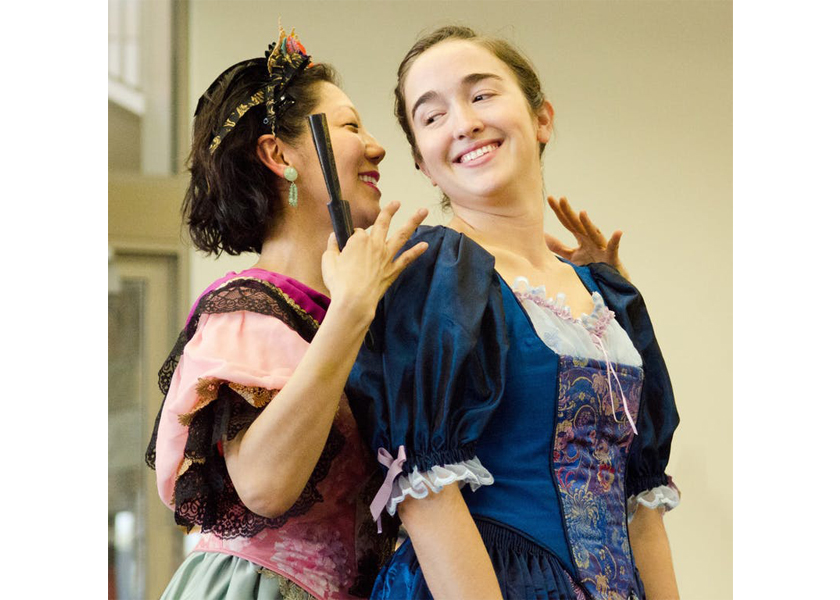With music and dance, Ten Thousand Things produces a play with a message of a woman’s self-realization | Theater Review by Anne Holzman (Summer 2019 issue)

The Sins of Sor Juana by Karen Zacarias
Ten Thousand Things Theater, Minneapolis ~ May 17 through June 9, 2019
In an upper room of the Open Book building in Minneapolis, on a cool spring evening, a couple hundred of us sat in three or four rows, in a large square with aisles at the corners, through which the actors of Ten Thousand Things theater company passed back and forth evoking seventeenth-century Mexico.
It worked remarkably well. The actors in The Sins of Sor Juana spoke mainly in English, the occasional Spanish quote from the poems of Sor Juana Ines de la Cruz serving mainly to remind us that most of what we were hearing was pretty much a guess at history. Because Ten Thousand Things operates out of a van, performing in prisons and parks, it uses economical sets and props. Costumes can be more lavish, but the company relies on adept acting and clever theater craft to draw its audience into a story.
Korean adoptee actor Sun Mee Chomet played the pivotal role of the Vicereine, an aristocrat of New Spain and Juana’s employer. Chomet’s considerable theatrical range got a workout. Not only is the role central to the play, but it requires the two-faced Vicereine to switch back and forth between demonstrating extravagant love for her servant Juana, and coldly betraying her in an attempt to prevent her from leaving. Furthermore, Chomet was double-cast as a very earnest, rule-abiding convent sister in the later-life timeframe of the play, when Juana has become a nun and added the “Sor” to her name. All of this required virtuoso acting flexibility, delivered breezily by the experienced Chomet.
The play is set in the New Spain (not yet called Mexico) of the real Sor Juana, who according to the program notes was born in the middle of the 17th century, of mixed-race parentage, and labeled “illegitimate.” She had access to books at her grandfather’s house and read widely. At 16, she was sent to live in Mexico City as lady-in-waiting to an aristocrat, where her intelligence became well known. She entered a convent, where she wrote prose and poetry and hosted salons. As she became famous, her range of topics was restricted by authorities, and it is thought that she eventually gave up on writing.
The play opens on the pivotal moment in Juana’s life when, having built a reputation as a poet and scholar, she is told she’ll be subjected to censorship. Needlework is proposed as a worthy alternative, and the script carries this image of proper womanhood throughout as a contrast to what women can accomplish intellectually. A few carefully-selected fragments of her poetry keep the play tied to the historical Sor Juana, but for the most part, the script is an exercise in speculation as to the past events and present frustrations that drove Juana away from her beloved writing.
And as speculation should be, it’s imaginative, daring, and fun. There is corruption, murder, deceit and betrayal. Ten Thousand Things director Marcela Lorca tapped the comedy and the pathos of the script in equal measure. The climax of the play is a drawn-out seduction scene, expertly played by Thallis Santesteban as Juana and Ryan Colbert as Silvio, in which the love of poetry becomes as dangerous and enticing as sexual attraction. Much of the action takes place in flashbacks to Juana’s years as the Vicereine’s servant, with George Keller rescuing what could be a cliché of an indigenous-wise-woman role by asserting her dignity and independence from this girl who has left the village behind.
It’s hard to pick a comic winner from this high-spirited cast, but from the moment he knocked over a screen trying to impress the ladies, to the whiny delivery of his parting shot at the close of the first half (“Want me, fear me, but do not dismiss me!”), Jason Rojas as Pedro drew the biggest laughs. The comic role served as a foil for earnest, if unanswered, regrets spoken by other characters: “We spend our whole lives holding our breaths and our tongues.”
Among its many accomplishments, Ten Thousand Things has worked out a complete theatrical package, incorporating music and dance in what could otherwise be a pretty talky play. Especially moving was a flamenco dance expressing the boundless fury of love betrayed; the bilingual poetry recitations which offered contemplative respites from the action, and lovely singing by the entire cast evoking a Gregorian chant. In one corner of the production space, Ten Thousand Things music director Robert Everest played a selection of instruments in a varied range of musical styles.
The Sins of Sor Juana was performed free of charge in prisons, and at community centers, and parks, with paid performances in the Open Book space, in May and early June, 2019. If you live in the Twin Cities and you have not seen a show, you owe it to yourself to take in this Minnesota treasure at the next opportunity.


